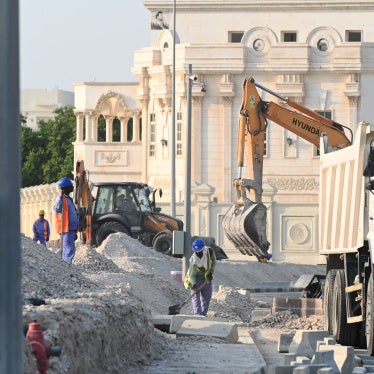As a former Australian leader and representative of our labour movement, Gillard cannot allow her visit to burnish a government that treats workers so badly
Most Australians only know Qatar as the country that beat Australia’s bid to host the 2022 Fifa World Cup. The small, affluent Gulf state may seem an odd choice for one of former Prime Minister Julia Gillard’s first international visits.
She is going to speak at a global summit on education, part of Qatar’s concerted effort to present itself as progressive on the world stage. But as a former Australian leader and representative of the Australian labour movement, Gillard should take care that her presence in Qatar is not used to burnish the reputation of her host.
The image Qatar seeks to promote is at odds with the reality on the ground. As the Guardian’s investigative reporting recently revealed, nowhere is this more evident than the way Qatar treats its rapidly growing migrant worker population.
Winning the bid to host the World Cup has transformed Qatar’s physical landscape and significantly increased the already huge number of migrant workers in the country. Only 10% of the country’s population of two million are Qatari nationals. Hundreds of thousands more migrant workers have been brought in to build gleaming new stadiums and hotels to host millions of tourists.
However, Qatar’s archaic labour system places workers in all sectors at risk of serious human rights abuses, including forced labour. Gillard will enter a country where passports are confiscated upon arrival for the vast majority of the population. Migrant workers are encumbered by exorbitant recruitment fees, workers are tied to one employer by the highly exploitative kafala (sponsorship) system, and trade unions are banned. Adding to their vulnerability, migrant workers must obtain an exit visa from their sponsor in order to leave Qatar.
In Australia, a single death on a work site is a tragedy that will make the national news. In Qatar, sadly, such deaths are all too common. As Human Rights Watch and the Guardian have both revealed, hundreds of workers leave in coffins every year, with many succumbing to apparent cardiac arrest in a country where temperatures regularly exceed 40 degrees in the summer months and the work day typically goes beyond 12 hours, six days a week.
Construction workers are not the only workers who face serious abuses. Under Gillard’s leadership, Australia played a leading role in drafting the ILO domestic workers’ convention, so she will surely be disturbed to find out that Qatari domestic workers don’t have basic protections under Qatari labour law, endure abysmally low wages and typically work without a day of rest. Some face serious physical, sexual and psychological abuse.
Despite an unprecedented level of international criticism this last month about the way Qatar treats its migrant workers, the Qatari authorities have yet to indicate how they plan to address the problem. Gillard arrives in Qatar at a time when the country faces a critical decision. It can either properly institute much-needed reform, or it can bury its head in the sand and hope that short-term PR-friendly initiatives will be sufficient to deflect international criticism.
In March, Gillard made a strong, impassioned statement, saying: “No to slavery … That is not a world we will accept … Not here. Not overseas. Not anywhere.” Some migrant workers in Qatar clearly work in situations that can be categorized as slavery. Gillard would do well to share with Qatari officials some positive models of what the Australian government has done to protect worker’s rights.
Silence on the plight of migrant workers may inadvertently play into the Qatari government’s charm offensive campaign. Playing along with this campaign would be of no service to Gillard or to Australia.









